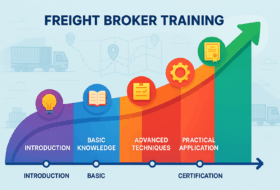How to Become a Freight Broker in MA or ANY State
The transportation industry has it’s own terms just like any other industry. If you can’t blend in or understand what a trucker is talking about when he says he’s hauling a reefer trailer or he’s over on his tandems you’ll have a difficult time in this market until you’re familiar with the terminology. How much weight can a trucker legally have on his tandems do you know? Or on his steering axle? Or what is considered bad states and locations to send a driver because it will be difficult to find them a load out of that area and they will have a lot of deadhead miles to get to a more profitable location.
This is the type of on the job information we include into our Freight Broker Training Guide, to prepare you for everyday situations like this in the logistics industry, and in a demanding “spot market” industry these tools will give you the competitive edge to make quick decisions that will earn you better profits.
Working as a freight broker can be an engaging and rewarding career for people who enjoy the fast-paced world of sales and negotiation. Freight brokers are responsible for arranging transportation for various types of freight, negotiating prices and informing their client of the shipment’s progress as it is hauled. They must hold a license and insurance, unlike freight agents, and can oversee these agents, who work as independent contractors and are responsible for sales and finding the proper carrier for clients’ needs.
Requirements for Becoming a Freight Broker in Massachusetts
The state of Massachusetts follows the standard federal guidelines when determining the qualifications necessary to become a freight broker. It is essential to meet these minimum requirements of education and training to become a freight broker in Massachusetts, but there are no additional requirements. In general, one must have a high school diploma or equivalent, and enrollment in a training program is highly recommended. All brokers must also carry a $75,000 surety bond, contingent cargo insurance and general liability insurance. These are the basics of how to become a Freight Broker in MA!
Tips on How to Become a Freight Broker with No Experience: A Step-by-Step Guide to Getting Started
Becoming a freight broker with no prior experience may seem daunting, but it’s entirely achievable with the right approach. Here’s a step-by-step guide to help you get started.
1. Understand the Role: A freight broker acts as a middleman between shippers and carriers, facilitating the transportation of goods. Familiarize yourself with industry terms, regulations, and the overall logistics landscape.
2. Research the Industry: Study the freight brokerage industry to understand trends, challenges, and best practices. Reading books, articles, and joining relevant online forums can provide valuable insights.
3. Take a Training Course: Consider enrolling in a freight broker training program. Many organizations offer courses that cover essential topics such as licensing, best practices, and negotiation skills, which can significantly enhance your knowledge.
4. Obtain Necessary Licenses: In the U.S., you must obtain a Freight Broker License (FMCSA) and a surety bond. Ensure you meet all legal requirements before starting your business.
5. Build a Network: Networking is crucial in this field. Attend industry conferences, join freight broker associations, and connect with carriers and shippers. Building relationships can lead to potential clients and partnerships.
6. Use Technology: Invest in logistics software to streamline your operations. Tools for load tracking, accounting, and customer relationship management can help you operate more efficiently.
7. Start Small: Begin with a few clients to manage your workload and gain experience. As you build your reputation, gradually expand your client base.
Embarking on a career as a freight broker requires dedication and effort, but with persistence, you can learn How To Become A Freight Brokert in his dynamic industry.
STARTED FOR ONLY $124
www.freightbrokerscourse.com
15% OFF Any Course!
Freight Broker FAQs
How Long Does the Training Take?
Answer: Our training is self paced and never expires so you can take as long or short as you want. However, most students complete the training in 2-3 weeks!
Is The Training Online?
Answer: Our training is 100% online and works on any device and is available in audio book, eBook, physical book or any website device.
Do We Get A License After Training?
Answer: We have partners that can help you get your Freight Broker Authority which is referred to as a license! We also have a guide to help you do it yourself!
What is the difference in being a Freight Broker or a Freight Broker Agent?
Answer: A broker is the owner of his or her own company. They are required to meet all legal requirements (Authority, Bond, BOC-3) to operate as a broker.
An agent works under the authority of the broker and typically receives a percentage of the brokerage fee.
Is there a need for more Freight Brokers in the industry?
Answer: U.S. Bureau of the Census County Business Patterns indicate that agricultural and manufacturing businesses are growing exponentially every year. Today, it is estimated that there are close to a million shippers. Needless to say, there is a very large market for brokers and agents. It has recently been estimated that freight transportation cost in the US is well over the multi billion dollar range annually and is rising. The amount of freight being moved by third parties such as freight brokers is currently estimated in the 20-30% range and growing. More shippers are using brokers & forwarders each year since it is usually much less expensive for a shipper to use an outsource, such as you and me, than to fund and maintain an in-house staff functioning as a transportation department. Employee-related costs are usually the most expensive part of any business operation. Paying a broker on a performance-only basis is the trend of the future with many shippers.
How can I locate the carriers and shippers for running the business?
Answer: There are several different areas in which to find shippers. A number of freight brokers purchase industry databases and member information of different industry organizations. You can also enter into Co-Broker agreements with other freight brokerages.
The primary job function you will perform is to contact companies who ship products and establish new accounts to use your services. You will also contact carriers in which to move your freight through using internet load boards, carrier databases and industry associations that you have acquired through networking.
How much money can I actually make as a Freight Broker?
Answer: Earnings are determined on your motivation to succeed, and also how you adapt to the industry. A full-time freight broker can easily make from $50,000 to well over six figures ($$$$$$). This is a recession proof business that provides unlimited income potential and a long range customer base for the right person.
What is a BOC-3?
Answer: BOC-3 is a processing agent. This is a representative upon whom court papers may be served in any proceeding brought against a motor carrier, broker, or freight forwarder.
How much is a surety bond?
Answer: You must post a bond of at least $75,000. The amount you pay for your bond depends on a number of factors including the type of bond you choose and the programs provided by the financial institution you choose to use.
How much does it cost to apply for your authority?
Answer: The FMCSA charges $300.00 to apply for operating authority (motor property carrier, motor passenger carrier, freight forwarder, broker). It requires that you fill out a 4 page form. You can do it online or by mail. We can also file for your operating authority with the FMCSA for a service fee of $349.00.
What are the legal requirements to operate as a Freight Broker?
Answer: You must apply for your authority from the Federal Motor Carrier Safety Administration (FMCSA) allowing you to act as a freight broker, post a $10,000 Surety Bond and file your BOC-3. You will also be required to complete a yearly Unified Carrier Registration.
What is the difference between a freight broker & freight agent?
Answer: A freight broker assumes all legal and financial responsibilities for the movement of cargo. They have met the requirements under the FMCSA Guidelines to legally operate as a property broker in the United States. A freight agent serves as an independent contractor for a freight brokerage but serves in the same capacity. Typically freight agents starting out will receive a commission of 50% of the gross profit from every load. An agent who is established with a book of business can command as high as 75% of the gross profit from freight moved for the brokerage. The agent in return does not assume any responsibility for insurance, authority, claims or collections of freight bills.
What is a Freight Broker (Property Broker)?
Answer: Property Broker is the correct terminology for many names used in the business to identify what we do. Truck Broker, Freight Broker, Freight Agent, Transportation Broker or Agent are all interchangeable terms synonymous with Property Broker’. Property Broker Authority allows a third-party to arrange pick up and delivery of a Shipper’s product by a Carrier without ever having physical control of the shipment.
How long is the course
Answer: The course is self-paced. There are no required study hours and course requirements. We do offer Quizzes and Certification but this is not mandated by the FMCSA.
Can I work from home?
Answer: Yes! In fact, when starting your business it is recommended that you start from a home office to keep your expenses low while you grow and expand your business.
I live in Canada. Am I required to secure a property broker authority?
Answer: Canadian residents who wish to broker freight within the United States must also apply for their broker authority with the FMCSA. For more information on Canada Freight Broker License Requirements visit our Canada Licensing page here.
What do I need to get started?
Answer: The following are the basic office tools required for starting a freight brokerage:
- Set Up Basic Office Equipment and Communication Tools:
- Acquire a computer, phone, and reliable internet access.
- Subscribe to Load Boards:
- Access online platforms to connect with shippers and carriers.
- Maintain Record-Keeping Systems:
- Implement a system to keep records of transactions and communications as required by law.
How much can I earn as a Freight Broker and how soon can I start earning?
Answer: Freight brokering is an excellent business and the agents and brokers that are successful are making anywhere from $40,000.00 to upwards of six figures per year depending upon the decision to work as an agent or broker and whether to operate a home-based business versus a larger office with employees. This business is based on contacts and relationships. It takes time to build contacts and relationships and turn them into paying customers. Sometimes it can take six months or longer to establish a solid customer base to see a profitable income, but it can be done in less time. Overall time lengths vary primarily on the individual\’s determination and desire to succeed in this business.
Can I apply for a Freight Brokers License if I have a felony on my record ?
Answer: Yes. having a felony does not mean you cant apply or be granted a freight brokers license from the FMCSA. You need ONLY to be a VALID US Resident.
I'm already a licensed freight broker. Can I use this to educate my agents?
Answer: Yes. Our material is tailored in a comprehensive manner so that new freight agents not only understand their responsibilities, but also those of the broker.
Is Freight Broker Training School required?
Answer: Freight Broker Training School is not required to receive your property broker authority. However, the failure rate for those who attempt this business without freight broker training is high. In order for a broker to be successful in any industry (stock broker, real estate broker, etc.), formal training is a must. We will prepare you to perform broker duties in a profitable, ethical manner, giving you the tools needed to be successful in the field.
You need a background in transportation or logistics to become a successful Freight Broker.
Answer: While a background in transportation or logistics can be helpful, it’s not a prerequisite for success as a Freight Broker. Many successful brokers come from diverse professional backgrounds and learn the industry through training and experience.
Freight Brokering is a get-rich-quick scheme.
Answer: Freight brokering, like any business, requires hard work, dedication, and time to build a profitable clientele. It’s not a guaranteed way to get rich quickly, but it offers the potential for a lucrative income over time.
What role does technology play in freight brokering?
Answer: Technology plays a significant role in modern freight brokering. Brokers use transportation management software, load boards, and other digital tools to connect with carriers and shippers, track shipments, and manage logistics efficiently.
Is there a demand for specialized freight brokers in niche markets?
Answer: Yes, there is a demand for specialized brokers who focus on specific niches such as temperature-sensitive goods, oversized cargo, or hazardous materials. Specialization can lead to higher earning potential.
How do I handle disputes or issues with carriers or shippers?
Answer: Disputes and issues can arise in the freight brokerage business. Effective communication and negotiation skills are essential. Brokers often have established protocols and contacts to help resolve problems.
Are there risks associated with being a Freight Broker?
Answer: Like any business, there are risks in freight brokering, such as financial risks and the potential for legal disputes. However, with proper training and risk management, these risks can be minimized.
All Freight Brokers are responsible for cargo claims and insurance.
Answer: Freight Brokers are not typically responsible for cargo claims or insurance. It’s the responsibility of the carrier to ensure the cargo, and shippers usually handle insurance matters.
How do I find and establish relationships with reliable carriers?
Answer: Building a network of reliable carriers is crucial. Brokers often rely on load boards, referrals, industry events, and online communities to connect with reputable carriers.
Can I start a freight brokerage business part-time while keeping my current job?
Answer: Yes, you can start a freight brokerage business part-time and transition to full-time as your business grows. It allows you to test the waters and minimize financial risks.
Do I need to be a U.S. citizen to become a Freight Broker?
Answer: You don’t need to be a U.S. citizen to become a Freight Broker, but you must be a valid U.S. resident to apply for property broker authority through the FMCSA.





